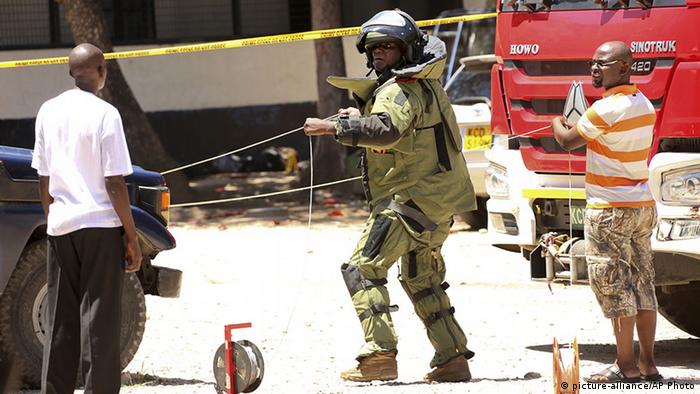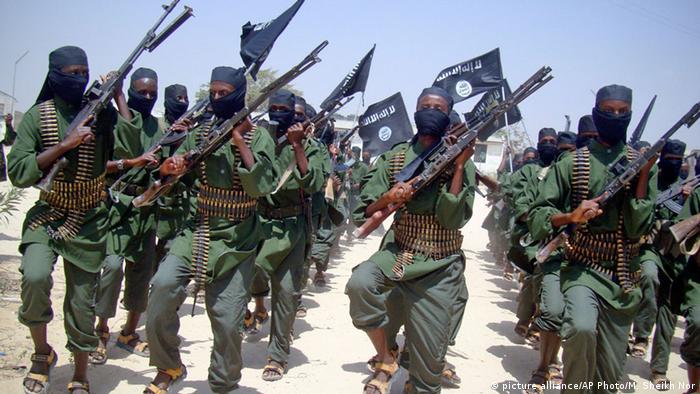Kenya
Kenya: Young, female, terrorist
For the first Time women have perpetrated in Kenya a terrorist attack. Expands the radicalisation of women in the Region?

Female terrorist in Kenya – this has not happened yet. On Sunday, three women entered a police station in Mombasa under the pretext of a phone theft report. “While she was interviewed, drew a woman with a knife, another threw a fire bomb at the police,” said the local chief of police Parterson Maelo reporters. His colleagues shot and killed the Attackers. Two officers were hospitalized with injuries in a hospital. Two days after the attack in the East African coastal city of Mombasa, three suspected complicit in published today, the inside of the Bombers before the court.
Who is behind the attack?
Yet, it is not clear on whose behalf the women have acted. The Somali Al-Shabaab militia has perpetrated in the past similar attacks in Kenya, albeit without a female assassin on the inside. According to a report by the East African regional organization IGAD Al-Shabaab has recruited in the past five years, however, increasingly women and girls. In an interview with Deutsche Welle Jarle Hansen, an expert on Islamism in the Horn of Africa at Harvard University, stresses the Stig, that inside Somalia, women to date has a curious role in the attacks of the militia have played. Outside of Somalia, however, this was different: “If you look to Kenya and Tanzania, women have a stronger profile.”

The policemen were able to repel the attack in Mombasa – they shot and killed the three Attackers
There is even a Tanzanian magazine for Jihadist. The articles of “Al-Ghuraba” is how a female supporter of the jihadists. It is a question of “how to dress and how to provide logistical help,” says Hansen.
“A new Form of extremism”
In East Africa, Al-Shabaab will also target women in order to recruit new members from the Diaspora. The medical student, Umu Elkhyr Sadri Abdulah from Tanzania had tried to win through social networks, women for Al-Shabaab. She was arrested in March 2015 in the Kenyan town of Mandera, along with two Kenyan women, with whom she was on the way to Somalia.
Zureiya Mohammed, a Muslim human rights activist in Mombasa, in the latest attack, a change of course, pointing to a new Form of extremism in Kenya: “In the past few years, we have dealt with the Problem of terrorism and on the international level, we know that women play an important role. Unfortunately, this Problem has arrived now for us, too.”
Local to global
Kenya’s experience with terrorist attacks have increased since 2011, drastically. As a sign of resistance against the Kenyan troops, in the framework of the
The African Union Mission in Somalia (AMISOM) since 2011 against Al-Shabaab to fight the militia in Kenya for a series of bloody attacks. Include the date of the most devastating attacks of the attack on the Westgate shopping Mall in Nairobi in 2013, with 67 deaths and the attack
to the University in Garissa in the year 2014 in which 148 people were shot.

The Al-Shabaab militia is no longer only active in Somalia
The militant Islamist Al-Shabaab emerged movement as a splinter group from the Union of Islamic courts, in 2006, Mogadishu, controlled, before it was ousted by Ethiopian troops. The Militia
controlled parts of southern Somalia and is seeking to expand his rule to all of Somalia.
In 2012, swore allegiance to Al-Shabaab, Al-Qaeda, the followers, and also recruits at a global level. Particularly in Kenya, Tanzania and Uganda, the organization has recruited new followers – your focus is on young adults and women.
Terror scare tourists
The Kenyan economy has suffered greatly under the attacks of Al-Shabaab, and in particular the tourism industry. The Kenyan tourist Board, approximately 380,000 people visited in 2014, the East African country in 2015, there were approximately 284,000. According to Hansen, the militia Kenya is trying to hit where it hurts the most: “Al-Shabaab, to create a General feeling of insecurity, the tourism industry, which is so important for the Kenyans.”

